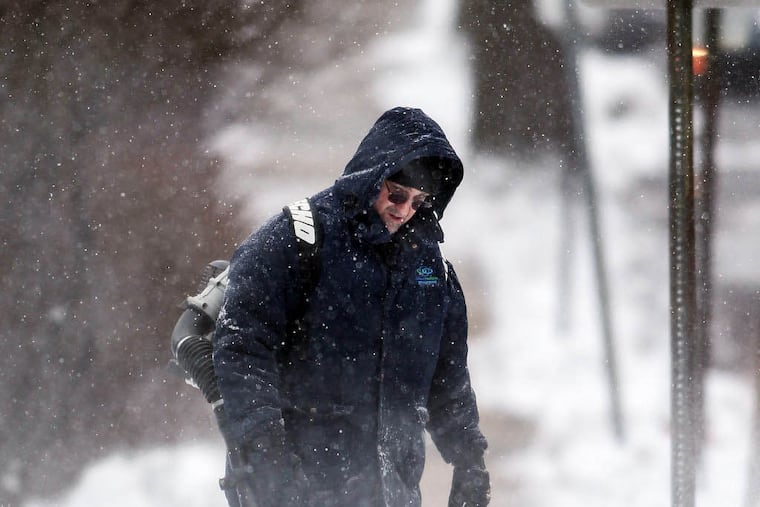KYW is changing how it does the weather. Will that help ratings?
NBC10 meteorologists are now doing the radio station's weather. For Glenn Schwartz, it's an implausible homecoming.

How the corporate climate change ultimately will affect the future of KYW Newsradio 1060 remains unclear, but the weather sure has changed at a station whose audience is accustomed to the predictable.
Since Feb. 10, longtime listeners have been hearing new but quite-familiar voices on the venerable news station, including NBC10 meteorologist Glenn Schwartz, for whom this is a most improbable homecoming. Schwartz and colleagues Bill Henley and Kristal Klei are now doing most of KYW’s drive-time forecast chores, a KYW official said.
Schwartz et al. replace the CBS3 weather team, which in 2014 supplanted AccuWeather, which had been a KYW staple for more than 40 years. It’s the latest shift in KYW’s weather, as it fights to adapt to a challenging media climate.
» READ MORE: KYW Newsradio 1060 launches partnership with NBC10, Telemundo62
KYW’s long reign at or near the top of the ratings had a lot to do with the rhythm of its news, traffic, and weather reports — especially the weather. For decades, the KYW Storm Center was the bread, milk, eggs, and firewood of impending weather doom.
On snow days, with its hold on the closing numbers, it ruled — a beacon of hope for millions of schoolchildren willing to put aside their passion for learning for a day.
» READ MORE: Reader memories: Listening to KYW for school snow closures
KYW has retained a decent-sized audience, but it no longer matches those of its halcyon days.
“The unfortunate thing is that there’s so many other places to get news, weather, traffic, and sports," said David Allan, professor of marketing at St. Joseph’s University and media specialist who had a 20-year radio career, including stints at WUSL-FM and WJJZ-FM.
» READ MORE: KYW ratings skid
Once upon a time, Newsradio was considered a revolutionary idea, but Allan said that today KYW is not unlike a top-40 station. And it is confronting some of the same issues as the folks who play the tunes: That music also is available elsewhere.
For Allan, KYW is part of his muscle memory. “I think, Why am I listening to this?" he said. “I still listen.”
And evidently so do a lot of other people. Although in the latest ratings it trailed several FM stations, some owned by Entercom, which bought KYW in 2017, KYW still had a comfortable lead as No. 1 on the AM band.
All-news, all the time
When Westinghouse Broadcasting Co. announced on June 18, 1965, that its newly acquired Philadelphia radio affiliate, KYW, would become a 24-hour news station, The Inquirer called it a “radical innovation.”
Who possibly would listen to news all day to the music of a clacking teletype machine? The answer: By 1970, KYW was claiming the largest audience in the Philadelphia market, and by the mid-1970s, KYW was averaging as many of 1.4 million listeners a week, based on Arbitron ratings.
It consistently clocked a late-arriving all-news rival, WCAU-AM, which eventually gave up the format.
KYW not only was an all-news pioneer, it also broke ground in its approach to weather, and that likely was a significant factor in its dominance.
The AccuWeather forecast
Traditionally, radio weather was a rip-and-read operation: Wire services transmitted the National Weather Service forecasts and hourly temperatures, which were then read dutifully on the air.
But in 1972 KYW signed on to a nascent weather company, AccuWeather Inc., based in State College and founded by Philadelphia and Central High School alumnus Joel Myers. It was only his second entry into the media market.
Myers, a Penn State professor, insisted that his forecasters be savvy communicators.
One of the masters was Elliot Abrams, another Central alum, who would become one of KYW’s most recognizable voices, the regular forecaster during morning drive time and a sine qua non during storms.
The AccuWeather meteorologists offered specificity — what time snow might start; how elevation would affect accumulations; where the rain/snow line might be — that wasn’t available in government forecasts at the time.
The AccuWeather-KYW relationship would endure more than four decades.
Hurricane comes full circle
Another of Myers’ early hires was Glenn Schwartz, also a Central alum, plucked out of a Penn State meteorology class after he beat Myers in a forecasting competition.
In 1972, he made his broadcast debut — on KYW.
"It was a big thrill to be able to do that,” Schwartz recalled.
Schwartz later did a stint at the National Hurricane Center and happened to be there during Hurricane Gloria, which hit the Jersey Shore in 1985. He was asked to do an interview with a radio station — a common request for meteorologists at the center during major storms — and he agreed.
Coincidentally, the station was KYW.
What’s ahead
As Bernie Shimkus, research director at Harmelin Media, a media consulting service and one of the region’s largest ad agencies, has pointed out, consumers can customize traffic and news alerts on their phones. (As for weather alerts: Be still my throbbing iPhone.)
» READ MORE: Tornado and storm warnings invading your phone? Making you numb? Forecasters are worried. | Maria Panaritis
Radio stations are relying on “personality” to draw listeners, Allan said, adding that KYW on-air personnel have become more animated.
KYW’s prime ally evidently is old listening habits. “It’s a generational thing. The demographics are getting older," said Allan. On the plus side, “the older demographics are a little more fashionable to ad agencies.” But, yes, they would far prefer the younger crowd.
In the end, whatever Entercom does with KYW and its other properties will transcend the quality of the five-day forecasts, Allan said.
“I think it’s a business deal that’s going to lead to other partnerships,” he said. “Something deeper going that really has a little to do with weather.”